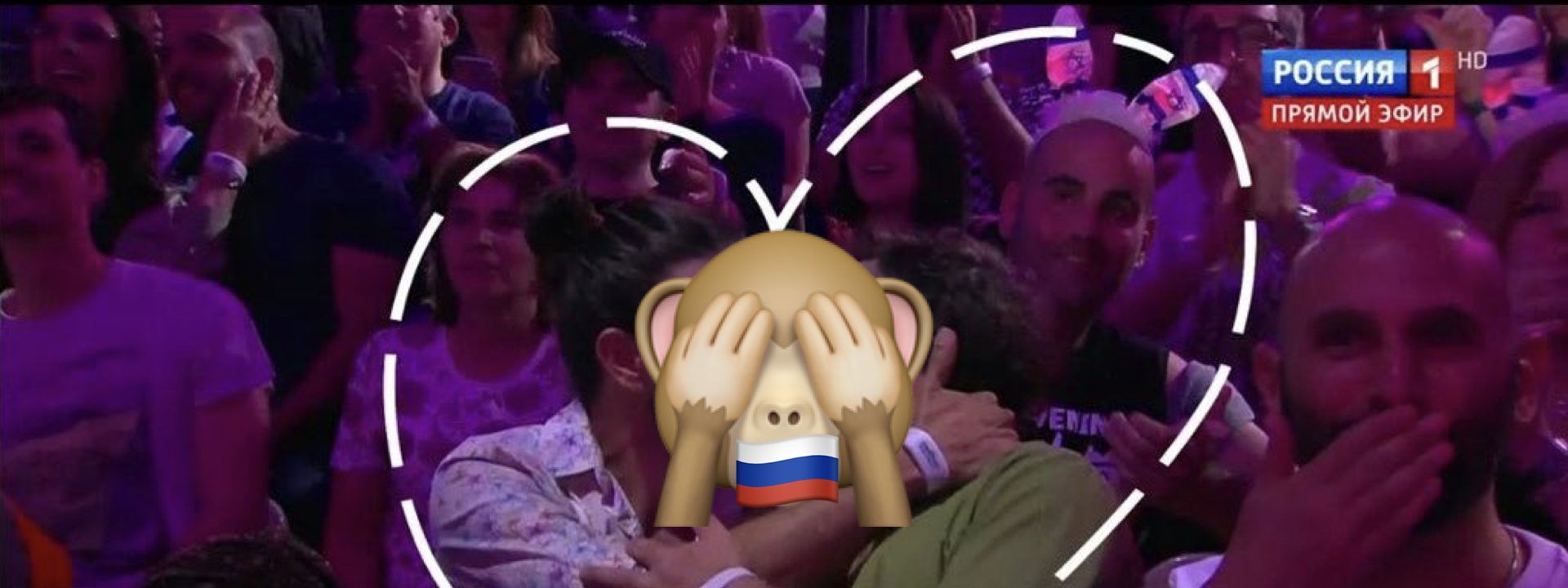Same-Sex Smooches Scare Pro-Kremlin Media
Breaking down how Kremlin media covered footage of same-sex couples kissing during the Eurovision 2019 semi-final
Same-Sex Smooches Scare Pro-Kremlin Media

Breaking down how Kremlin media covered footage of same-sex couples kissing during the Eurovision 2019 semi-final

Russian social media users were decidedly mixed about seeing same-sex couples kissing on state-owned television during the Eurovision 2019 song context, while Russian news coverage largely portrayed public reaction as negative.
The coverage of the footage and, more importantly, the reactions to it demonstrated how both government-owned and independent Russian media navigate the country’s so-called “gay propaganda law,” which the parliament passed in 2013. The law forbids exposing minors to content that explains or justifies same-sex relationships.
On May 14, Russian state-owned television channel Rossiya 1 showed several same-sex male couples kissing onscreen during the official live broadcast of Eurovision 2019’s first semi-final. After the fact, Kremlin-owned media outlets remained silent about the footage, while some private-owned pro-Kremlin media outlets characterized the social media reaction as wholly negative, when it was actually mixed.
Verifying the Footage
The recording of the live broadcast is available to internet users in Russia only. Russian entertainment media outlet TJournal.ru captured some of the kisses with the Rossiya 1 logo in the top right corner, together with the “live broadcast” (Прямой эфир) marker, confirming that the broadcast took place.

The producer of the live broadcast, Iosif Prigozhin, discussed the footage during an interview on the radio program Govorit Moskva (translation from Russian: “Moscow Speaks”). He said that the channel did not have the authority to exclude the footage from the broadcast:

Kremlin-Owned Media Ignores the Incident
Pro-Kremlin media outlet Gazeta.ru covered the first semi-final and was the first to report on the footage of the same-sex couples kissing. A Google Search identified 17 articles about the footage published by Russian media outlets. Four of the media outlets that covered the incident were pro-Kremlin mainstream news outlets: Gazeta.ru, Lenta.ru, Rambler, and Dni.ru. Kremlin-owned media outlets, including RIA Novosti, Sputnik, RT, and Vesti.ru, on the other hand, simply decided not to discuss the same-sex kisses.

Two media outlets reported that, at first, a representative from Rossiya 1 did not comment on the footage. Eight media outlets wrote about expert opinions of the broadcast being on state-owned television. These outlets cited Member of the Russian Parliament Vitaliy Milonow’s suggestion that state television blur the shots, for example, or Russian LGBT activist Nikolay Alekseev’s explanation that state television was legally obliged to broadcast the full version of the contest. Nine media outlets emphasized that the footage triggered a negative reaction on social media.
Debunking the Reaction on Social Media
Gazeta.ru was similarly the first outlet to write about the reaction on social media. The headline of Gazeta.ru’s article referred to the footage as having “caused a negative reaction.” Other media outlets characterized the reaction on social media with stronger words. Rambler wrote that viewing a same-sex couple made the audience “madly angry.” Pro-Kremlin media outlet Tsargrad used a quote in its headline from a social media user calling for the couples to be “sprinkled with holy water.”
The Russian news media outlet URA.ru quoted some of the negative reactions on social media to the footage, along with usernames. The DFRLab found most of the posts; all except one were comments on a tweet of Gazeta.ru’s first article. All of the quoted posts were exclusively negative.

While most of the comments under the tweet were homophobic, the DFRLab identified 14 out of 54 comments, or 26 percent, that were not. Balanced reporting would require mention of at least one neutral or positive tweet.
Six of the 14 tweets criticized the negativity in the comment section. For example, Twitter user @vladasovba wrote: “The comments show — mental audience of a state newspaper.”

Five tweets out of the 14 shared positive emotions about the kiss. A Twitter user @propaganda_6_21 commented: “Way to go, boys!”

There were also three tweets that suggested the footage was not newsworthy. “What an event!” @chelovek_A wrote: “Are you from a zoo or what?”

These comments showed that URA and Gazeta.ru provided an incomplete and biased account of what Twitter users who commented on the news story thought of the incident.
Russian state-owned television could not control the content shown during the live broadcast of Eurovision 2019’s first semi-finals, but the onscreen same-sex kisses broadcast to the Russian domestic audience risked running afoul of the Kremlin’s “anti-gay propaganda law.” As a result, Kremlin-owned media ignored the coverage after Gazeta.ru’s initial reporting, but Gazeta.ru and a few other pro-Kremlin media outlets later misrepresented audience reaction on social media as exclusively negative, when in fact there were several neutral — as well as some positive — comments in the mix.
Follow along for more in-depth analysis from our #DigitalSherlocks.

